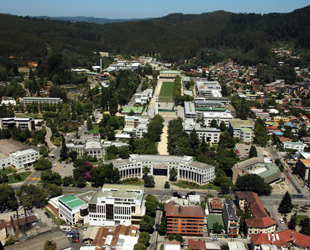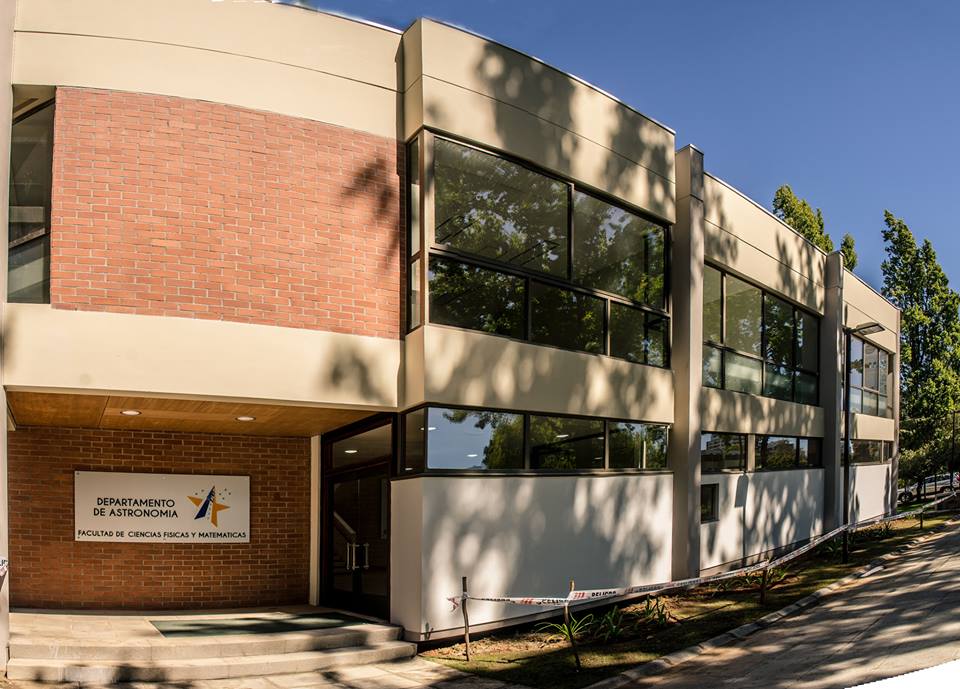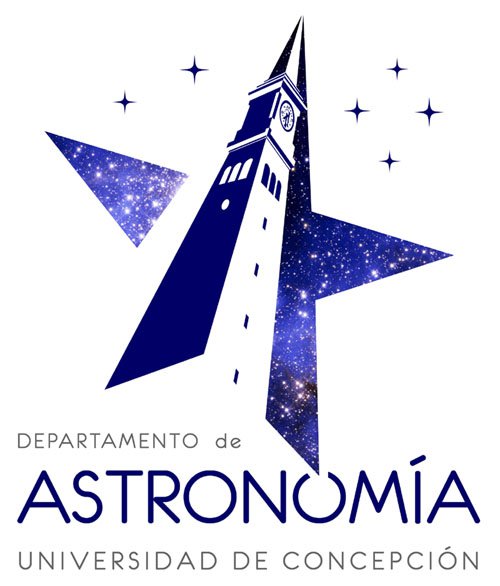Who we are


The Department of Astronomy is an independent research institute within the faculty for Mathematics and Physics (FCFM) at the University of Concepción (UdeC) in the city of Concepción in Chile.
The University of Concepción was founded in 1919 and is one of the largest and the most successful university in Chile outside the capital Santiago.
Our department started out with the arrival of Dr. Ronald Mennickent who was hired by the physics department in 1994. Soon after, with hirings of Dr. Wolfgang Gieren in 1996, and Dr. Douglas Geisler in 1999 the Astronomy Group was formed.

In 2007 we became an independent department and started our own undergraduate programme. Finally, in 2015, we obtained our own building next to the main faculty building. At the moment we are working hard to start our own graduate programmes (Magister and PhD).
Today the department counts 12 faculty members working in a big variety of astronomical research fields ranging from variable stars to distant galaxy clusters and from instrumentation via observation to theory.
The following video (available also in youtube) is explaining the history of our department in Spanish.
Our History
Since its inception, the development of professional astronomy at the Universidad de Concepcion has been linked to the development of the international observatories in Chile. In 1992, ESO compiled a public exhibition featuring the future Very Large Telescope then being planned, and sent it on a national tour which included Concepcion. The Universidad has had a long history of hosting a strong Physics Dept., and several of the physicists attended this exhibition, including the then Director, Fernando Gutierrez. As a result, they decided it would be advantageous for the Universidad to include astronomers and in 1994 the Dept. hired the first astronomer, Ronald Mennickent, a Concepcion native who in fact was the first astronomer to receive his PhD at a Chilean institution, PUC. In 1997, the Physics Dept. added another astronomer, Wolfgang Gieren, PhD. Bonn University. In 1999, both Douglas Geisler, PhD University of Washington, as well as Tom Richtler, PhD Bonn University, arrived on the staff. Geisler brought with him the first astronomy postdoc, who was soon joined by several other postdocs.
By 2001, the astronomy staff in the Physics Dept. had sufficient personnel to form the Astronomy Group, with Dr. Gieren as its head. Although this was merely an informal step, it allowed the astronomers to have a more visible profile to the outside world and join in potential large projects. This latter came to fruition in 2002 when the Astronomy Group, together with astronomers at the then only other two Chilean astronomical institutions, Universidad de Chile and PUC, was awarded a prestigious FONDAP grant, the largest science grant administered (until then) by the Chilean government.
As the Group continued to grow, additional physical space was required. In 2000, astronomers occupied a large part of the new 6th floor of the Facultad de Ciencias Fisicas y Matematicas building, which included both office space as well as a 30cm telescope. This was installed on the roof inside its dome with the help of several volunteers from ACHAYA, a Chilean amateur astronomy society based in Santiago. This campus observatory has been a real work horse, serving both the public, students, classes and even professionals. In 2003, a second addition was made to the FCFM building for astronomy, financed by the Fundacion Andes. In the following year, Neil Nagar joined the Group, bringing with him new expertise both as an instrumentalist as well as an electrical engineer, having received PhDs in both astronomy (Maryland) as well as EE. Neil began to develop an instrumentation lab.
Scientifically, the Group helped establish itself worldwide by organizing several international meetings. The first of these was IAU Symposium No. 207 on Extragalactic Star Clusters organized by Doug and Eugenia Geisler and Eva Grebel (Heidelberg) in the beautiful city of Pucon in 2001. This was the first , and still the only, IAU Symposium organized by a Chilean university. This was followed in 2002 by a meeting on the Extragalactic Distance Scale, organized by Wolfgang Gieren and Eugenia Geisler. Eugenia took over as the Group librarian in 2002 as a volunteer and then as a paid staff member in 2002 thanks to FONDAP.
During all of this time, there was no official astronomy curriculum and only a very small number of astronomy classes offered. This finally changed in 2003? with the creation of the Carerra entitled Ciencias Fisicas y Astronomicas, which included for the first time a variety of astronomy courses. However, it was primarily a Physics program and not optimum for the development of astronomers able to take the best advantage of the growing number of world-class facilities in the north. The Physics Department has long offered both a Masters as well as a PhD program, and these began to attract a growing number of graduate students interested in astronomy. The first PhD was awarded to a student working in astronomy in 2005?
During a visit by the ESO Head of Science and his counterpart in Chile, Bruno Leibundgut and Felix Mirabel, to the Universidad in 2006, a strategy was devised for future development of the Group. This plan was carried out and has been very successful. It began with the creation of the new Carrera de Astronomia in 2007, which admitted 30 freshman. This undergraduate program includes at least 1 astronomy class every semester for the entire 4 year program and also offered an extra 1.5 years leading to a professional Titulo degree, basically equivalent to a Masters. The program allowed the hire of 3 new professors over the next several years, including Mike Fellhauer, PhD Heidelberg University, in 2008, Ricardo Demarco, PhD Universidad Denis Diderot, in 2009 and Sandro Villanova, PhD Padua University, in 2011. Several of these astronomers actually spent a year or two at UdeC prior to their official hire thanks to the awarding of very generous Visiting Professor grants from the ESO-Chile Comite-Mixto fund.
By 2008, with the Carrera well established and a growing number of both professors as well as postdocs, the Group successfully lobbied and won their independence from Physics, forming the Astronomy Department, whose first director from 2008-2012 was Dr. Wolfgang Gieren. Auxiliary staff included a departamental secretary, Mrs. Marcela Sanhueza, a parttime Systems Manager, Ronald Burgos, an Observatory Director and a janitor, Victor Mora.
The Department has continued to grow and develop in a variety of areas since then. Professor Ezequiel Treister was hired in 2012 (he subsequently left), Rodrigo Reeves (PhD UdeC) in 2014, Dominik Schleicher (PhD Heidelberg) in 2015, Amelia Stutz (PhD University of Arizona) in 2016 and Stefano Bovino (PhD Universidad Rome Sapienza) in 2017. Astronomers have been very successful in winning a number of important grants, including FONDECYT, Anillo, GEMINI-CONICYT, ALMA-CONICYT, Comite Mixto, QUIMAL, etc. The largest of these is a BASAL grant, a 10 year grant awarded in 2008, which is essentially a continuation of the very successful FONDAP collaboration with UC and PUC. Another large fund is the Instituto Milenio MAS grant of which UdeC is a part. There are a large number of postdocs associated with the Department, ranging typically now from 10-20, which greatly enhance the scientific productivity and international reputation. The Department also participates in the Unidad Mixta Internacional (UMI-FCA), an international research organization funded by the French government, together with their UC, PUC and French colleagues.
In terms of refereed scientific publications, the Department annually is recognized as being the most productive on campus, accounting for some 10-15% of all University publications. Two of our professors, Doug Geisler and Wolfgang Gieren, are two of the three most productive researchers at Udec over the last 20 years. During the period from 2010-2015, three professors, Gieren, Geisler and Mennickent, were awarded the prestigious Premio Municipal de Ciencias by the Mayor of Concepcion.
The success of the Department's development was highlighted by the inauguration of a new dedicated two-story building to house the Department in March, 2015. The new building includes the Department offices, offices for professors and postdocs, large common offices for PhD, Master's and advanced undergraduates working on theses, a large classroom/auditorium, a meeting room, computer room, library, kitchen facilities, etc. In addition, it creates a large space to further develop the growing instrumentation lab called CePIA (CEntro Para Instrumentacion Astronomica). Under the directorship of Rodrigo Reeves, CePIA is involved in a growing number of important instrumentation projects... Finally, there is also office space for our fulltime Public Outreach officer, Marllory Fuentes, and her team of eager student helpers called EDA (Equipo de Divulgacion Astronomica). General public education and outreach has become a cornerstone of the Department's efforts to promote astronomy in the Chilean culture. The Department regularly organizes a large number of activities to involve the public and raise its awareness about the wonders of the Universe. We offer public observing nights at the campus observatory, frequent lectures, host invited speakers, offer public courses, etc. Two major annual activities which the Department hosts are the Summer School for Teachers, where high school science and math teachers in the region spend two days learning about the latest scientific results and astronomical educational resources available, and the Congreso Astronomico Escolar, an original research activity which involves regional science students, a teacher and a trained astronomy tutor provided by the Dept. All teams come together after their months-long project and present their results at a 1 or 2 day-long meeting which includes a team of expert judges. Winners of the competition are awarded with an overnight visit to one or more of the international observatories in the north. Both of these activities are recognized as flagship efforts to engage Chilean students and teachers in this fascinating field.





